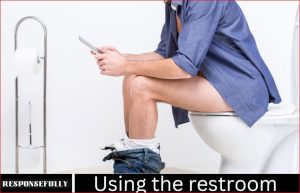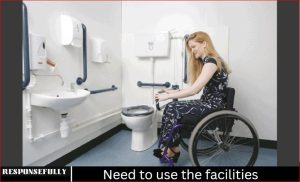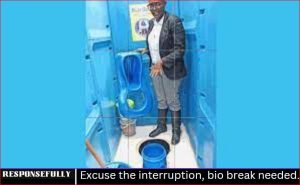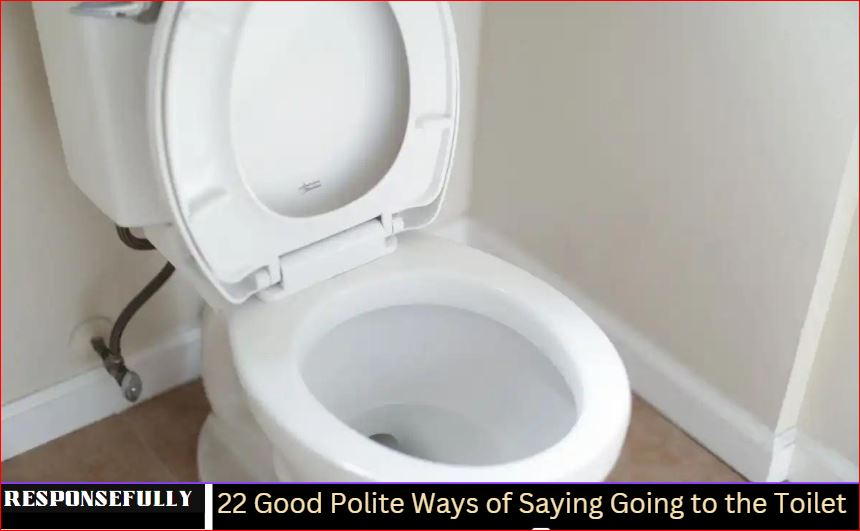Table of Contents
In casual discussions, some subjects warrant discretion over open discourse, such as the act of using the restroom.
Despite its naturalness, openly declaring the need to ‘go to the bathroom’ can evoke discomfort in others.
Good Polite Ways of Saying Going to the Toilet
- Using the restroom
- Off to the bathroom
- Heading to the lavatory
- Making a quick stop
- Need a restroom break
- Time for a brief pause
- Powder room visit
- Off to handle business
- Taking care of nature’s call
- Need to use the facilities
- Gotta go for a moment
- Splash some water on my face
- I need to visit the washroom.
- Heading to the WC (water closet).
- I’ll be right back, just need a moment.
- Excuse me, restroom break.
- Excuse the interruption, bio break needed.
Using the restroom
“Taking a trip to the loo” offers a polite alternative to “going to the toilet,” employing a playful and euphemistic expression for using the restroom. In British English, “loo” serves as a colloquialism for the toilet, carrying a lighthearted and informal tone that can alleviate any potential awkwardness. This phrase indicates a lack of formality or seriousness, while upholding a level of politeness and decorum.

Off to the bathroom
“Off to the bathroom” serves as a courteous alternative to “going to the toilet” by offering a straightforward and factual description of the restroom visit without being overly explicit. The term “bathroom” is widely accepted and carries a neutral, inoffensive tone, commonly referring to the room where people wash themselves. This phrase allows one to communicate the need for a restroom visit without drawing undue attention or making it a focal point of conversation.
Heading to the lavatory
“Heading to the restroom” offers a courteous alternative to “going to the toilet” by employing a formal and polite term for the restroom visit. “Restroom” is a commonly used euphemism in public settings like restaurants, hotels, and offices. It signals an awareness of social norms and demonstrates respect and consideration for others.
Making a quick stop
When considering polite alternatives for “going to the toilet,” opting for the expression “making a pit stop” presents a lighthearted and socially acceptable option. This phrase finds its origin in informal contexts where acknowledging the need for a restroom break is necessary while minimizing discomfort or embarrassment. Derived from motorsports, where drivers make swift stops to refuel or change tires mid-race, “pit stop” suggests a brief interruption from ongoing activities, aligning well with the concept of using the restroom. Employing this phrase allows individuals to communicate their need for a brief pause without explicitly mentioning the purpose, rende
Need a restroom break
Employing the expression “got to go potty” is commonly linked with young children who are learning to communicate their urge to use the restroom. Despite its informal nature, it can be utilized in a playful manner within circles of friends or family. This phrase fosters a sense of camaraderie and light-heartedness, allowing for the discussion of bodily needs without eliciting discomfort. By substituting “potty” for “toilet” or “restroom,” the speaker infuses the conversation with an element of innocence and charm, rendering it a polite means of indicating their need to use the facilities.
Time for a brief pause
The expression “time for a toilet break” offers a direct and courteous means of indicating the need to use the restroom. It finds frequent use in professional environments, particularly when individuals need to excuse themselves from meetings, conferences, or other work-related engagements. This phrase acknowledges the significance of attending to personal needs while upholding professionalism and consideration for others. It reinforces the notion that restroom use is a fundamental and ordinary aspect of human life, emphasizing the temporary nature of the interruption by framing it as a “break.”
Powder room visit
“Need to powder my nose” is a euphemism stemming from the Victorian era, where women would discreetly step away from social gatherings to freshen up their makeup, often applying face powder. Though historically linked with women, this phrase can be employed by anyone to politely signify the need for a restroom visit. Infusing the conversation with a sense of refinement and sophistication, it maintains a level of discretion. Through this expression, individuals can convey their intentions without directly addressing bodily functions, rendering it a polite and socially acceptable means of excusing oneself for a restroom break.
Off to handle business
“Going to drop the kids off at the pool” offers a playful and whimsical spin on referring to a bathroom visit. It serves as a humorous description, particularly for urination, often employed in jest or with sarcasm. Originating from the concept of “dropping off” children at a pool, it humorously alludes to the act of “dropping off” a urine sample. This phrase finds frequent use in casual or informal settings, such as among friends or in comedic performances.
Taking care of nature’s call
“Off to do my business” presents a professional and courteous manner of referencing a restroom visit. The phrase “do my business” serves as a euphemism for using the bathroom, typically reserved for formal or professional environments like workplaces or business meetings. It allows for a discreet mention of the restroom visit without being overly explicit or crude, thus upholding a sense of professionalism and decorum while acknowledging the necessity of attending to personal needs.
Need to use the facilities
“Gotta go number one (or number two)” is a light-hearted and informal expression for indicating a trip to the bathroom. “Number one” denotes urination, while “number two” signifies defecation. This phrase is commonly employed in casual or humorous contexts, offering a way to mention bathroom needs without being overly explicit. It’s frequently used among friends or in informal gatherings, such as parties or social events.

Gotta go for a moment
“Going to take a leak” is a colloquial and relaxed manner of referencing a bathroom visit. The expression “take a leak” is slang for urination and is commonly employed in casual or humorous contexts. Typically used among friends or in informal environments like bars or sporting events, it offers a way to mention the need for the restroom without adopting a formal or explicit tone.
Splash some water on my face
Employing the expression “need to splash some water on my face” offers a tactful means of indicating the need for a restroom visit without directly stating it. This phrase is suitable for situations where one seeks to freshen up or take a brief break. By emphasizing the action of splashing water on the face, it shifts focus away from the primary purpose of the visit, thereby enabling a more subtle and courteous way of communicating the need to use the restroom.
I need to visit the washroom.
“I need to use the lavatory” is a refined and courteous means of expressing the need for a restroom visit. The term “lavatory” typically evokes associations with upscale or formal environments like hotels or restaurants. Employing this term allows individuals to convey their intention to use the restroom with respect and discretion. It upholds a sense of decorum while effectively communicating the necessary information, rendering it a polite choice of wording.
Heading to the WC (water closet).
Employing the term “WC” offers a polite and formal means of indicating a restroom visit. Originating from the concept of a “water closet,” where the toilet was housed in a separate room often equipped with a flushing water tank, it conveys a sense of formality and respect. This term is commonly utilized in formal settings like offices, restaurants, or hotels, where upholding a certain level of decorum is customary. By choosing this term, individuals signal a level of propriety and adherence to social norms, making it a fitting choice for referring to restroom facilities in formal environments.
I’ll be right back, just need a moment.
The expression “going to the john” is a frequently used euphemism for visiting the toilet. It provides a casual and colloquial alternative suitable for informal conversations or among friends. While its exact origin is uncertain, it is thought to stem from the name “John Harington,” an English author credited with inventing a flushing toilet in the late 16th century. Over time, “john” has become synonymous with the toilet itself. This phrase contributes to a polite atmosphere while employing a more relaxed and familiar language.
Excuse me, restroom break.
“Going to the can” is another informal and casual expression for using the toilet. The term “can” serves as slang for a toilet and is frequently used in North America. While its exact origins remain uncertain, it is thought to stem from the historical use of metal cans as chamber pots. Although “can” may lack the formality of other terms, it can still be deemed polite in specific social settings, particularly among friends or in informal gatherings. Nonetheless, it’s essential to consider the appropriateness of using this term, as it may not be suitable in more formal or professional environments.
Excuse the interruption, bio break needed.
“I need to go to the privy” is an antiquated yet polite means of signaling a bathroom break. Historically, “privy” referred to an outhouse or exterior shed serving as a bathroom, though modern plumbing has rendered them obsolete. Nevertheless, the phrase maintains its discreet and tactful undertones from its original context. By opting for “privy,” individuals indicate a brief departure to tend to a fundamental human need without resorting to explicit language. The archaic term lends a gentler tone to the request for temporary leave.

Frequently Asked Questions
Certainly! Here are some frequently asked questions (FAQs) about polite ways of saying “going to the toilet”:
What are polite alternatives to “going to the toilet”?
Polite alternatives include phrases such as “using the restroom,” “going to the bathroom,” or “visiting the lavatory.”
Why use polite language when referring to using the toilet?
Polite language helps maintain decorum and respect in social interactions, especially in formal or public settings.
What are some euphemisms for using the toilet?
Euphemisms include expressions like “making a pit stop,” “powdering my nose,” or “taking a break.”
How can I politely excuse myself to use the toilet in a conversation?
You can say, “Excuse me, I need to use the restroom,” or “Pardon me, I’ll be right back, just need a quick bathroom break.”
Are there cultural differences in polite ways of referring to using the toilet?
Yes, cultural norms may influence the language used. It’s essential to be mindful of cultural sensitivities when choosing expressions.
Can I use informal or colloquial language to refer to using the toilet?
It depends on the context. In casual settings among friends, informal language may be acceptable. However, in formal or professional environments, it’s best to use polite language.
What are some polite phrases for indicating the need to use the toilet in a formal setting?
Polite phrases include “I need to use the facilities,” “I require a brief restroom break,” or “May I excuse myself for a moment?”
Is it appropriate to use humor when referring to using the toilet politely?
Humor can lighten the mood, but it’s essential to gauge the situation and use discretion, especially in formal settings.
Are there gender-specific polite phrases for referring to using the toilet?
While many phrases are gender-neutral, some may specify “men’s room” or “women’s room” depending on restroom facilities.
Can I ask for directions to the toilet politely in a public place?
Yes, you can politely ask, “Could you please direct me to the nearest restroom?” or “Where can I find the restroom, please?”
Conclusion
using polite language when referring to going to the toilet is essential for maintaining decorum and respect in social interactions. Polite alternatives such as “using the restroom” or “visiting the lavatory” help create a comfortable and respectful atmosphere, especially in formal or public settings. Euphemisms and polite phrases offer individuals a variety of options to communicate their need to use the toilet discreetly and respectfully. It’s important to be mindful of cultural differences and context when choosing language. Overall, incorporating polite language into conversations about using the toilet contributes to positive social interactions and demonstrates consideration for others’ comfort.
